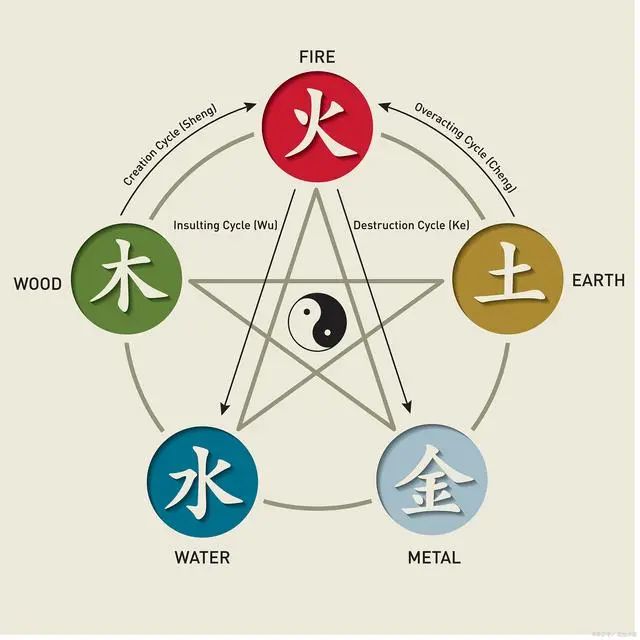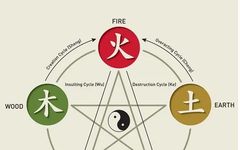The Five Elements (Wu Xing) is a fundamental concept in ancient Chinese philosophy and metaphysics, referring to the five substances: Metal (Jin), Wood (Mu), Water (Shui), Fire (Huo), and Earth (Tu). These elements are not only the five basic elements of nature but also represent five fundamental attributes of the human body and society. The relationship between the Five Elements is characterized by mutual interaction and influence, known as “mutual generation and mutual overcoming” (相生相克), which is the core content of the Five Elements theory and an important basis for metaphysics.
What is the principle of mutual generation and mutual overcoming? In simple terms, it refers to a sequence and law among the Five Elements, whereby they can promote or restrain each other, thus forming a dynamic balance. Specifically, there are several aspects:
– Mutual Generation (相生): This refers to one element promoting the development and enhancement of another element, making it more vigorous and beneficial. The order of mutual generation is: Wood generates Fire, Fire generates Earth, Earth generates Metal, Metal generates Water, and Water generates Wood. For example, Wood can help Fire burn, Fire can produce ash (Earth), Earth can nurture Metal, Metal can condense Water droplets, and Water can nourish plants.
– Mutual Overcoming (相克): This refers to one element suppressing or consuming the power of another element, making it weaker and less beneficial. The order of mutual overcoming is: Wood overcomes Earth, Earth overcomes Water, Water overcomes Fire, Fire overcomes Metal, and Metal overcomes Wood. For example, Wood can damage the land, Earth can block water flow, Water can extinguish fire, Fire can melt metal, and Metal can cut down trees.
– Excessive Generation Leads to Overcoming (反生为克): This refers to when one element is too abundant or vigorous, it can harm the other element it generates, causing a loss of balance and coordination. Situations of excessive generation leading to overcoming include: Metal relies on Earth for growth, too much Earth buries Metal; Earth relies on Fire for growth, too much Fire scorches Earth; Fire relies on Wood for growth, too much Wood chokes Fire; Wood relies on Water for growth, too much Water causes Wood to float; Water relies on Metal for growth, too much Metal makes Water murky. For example, Metal needs soil to cultivate and preserve it, but if the soil is too abundant or thick, it can bury or rust the Metal; Fire needs Wood to provide fuel and heat, but if there is too much Wood, it can cause the fire to become uncontrollable or suffocated.
– Excessive Offspring Destroys the Mother (子众灭母): This refers to when the offspring of one element becomes too abundant or vigorous, it can consume or suppress the mother element it relies on, causing it to lose support and protection. Situations of excessive offspring destroying the mother include: Excessive Wood resembles Fire, thus consuming the mother Water; Excessive Fire resembles Earth, thus consuming the mother Wood; Excessive Earth resembles Metal, thus consuming the mother Fire; Excessive Metal resembles Water, thus consuming the mother Earth; Excessive Water resembles Wood, thus consuming the mother Metal. For example, Wood needs Water to nourish and sustain it, but if there are too many plants, they can dry up the water source or obstruct it; Fire needs Wood to generate and warm, but if the fire is too large and hot, it can burn up or wither the Wood.
– Extremes Lead to Reversal (物极必反): This refers to when one element is too vigorous or weak, it can transform into another element, causing changes and conversions. Situations of extremes leading to reversal include: Excessive Wood resembles Fire, excessive Fire resembles Earth, excessive Earth resembles Metal, excessive Metal resembles Water, excessive Water resembles Wood; Weak Wood resembles Earth, weak Water resembles Fire, weak Metal resembles Wood, weak Earth resembles Water, weak Fire resembles Metal. For example, if Wood is too vigorous, it becomes dry and flammable, resembling the nature of Fire; if Water is too weak, it becomes warm and evaporates, resembling the nature of Fire.
What are the applications of mutual generation and mutual overcoming? In simple terms, it involves analyzing and adjusting a person’s fate and fortune based on the relationships of mutual generation and overcoming among the Five Elements, thereby achieving alignment with the timing of nature, improving human affairs, and enhancing quality. Specifically, there are several aspects:
– Fate Analysis (命理分析): This refers to analyzing a person’s Ba Zi (Eight Characters) based on their birth date and time to determine their Five Element attributes and favorable or unfavorable elements, thus inferring their character, talents, health, wealth, marriage, career, and other aspects of fortune. Fate analysis must consider the relationships of mutual generation and overcoming among the Five Elements to determine whether the elements in the Four Pillars are balanced and coordinated, and whether they are conducive to the functioning of the favorable elements. Generally, if the relationships of mutual generation and overcoming among the Five Elements in the Four Pillars are reasonable and moderate, it indicates that the person’s fortune is relatively smooth and stable; if they are imbalanced and extreme, it indicates that the person’s fortune is more difficult and fluctuating.
– Name Studies (姓名学): This refers to calculating a person’s Five Element attributes and numerical relationships based on the strokes or pinyin letters of their name, thus inferring the degree of compatibility and influence with their Ba Zi. Name studies must consider the relationships of mutual generation and overcoming among the Five Elements to determine whether the elements in the name can supplement or adjust the deficiencies or excesses in the Ba Zi. Generally, if the elements in the name can coordinate and complement those in the Ba Zi, it indicates that the name is beneficial to the individual; if the elements in the name conflict or negate those in the Ba Zi, it indicates that the name is detrimental to the individual.
– Feng Shui Layout (风水布局): This refers to selecting suitable directions, colors, shapes, and items based on the environment and space where a person lives or works, thereby influencing their energy field and atmosphere. Feng Shui layout must consider the relationships of mutual generation and overcoming among the Five Elements to determine whether the elements in the environment can meet or improve the individual’s Five Element needs and tendencies. Generally, if the elements in the environment align with or support the individual’s preferred or needed elements, it indicates that the Feng Shui is beneficial; if the elements in the environment align with or conflict with the individual’s disliked or excessive elements, it indicates that the Feng Shui is detrimental.


